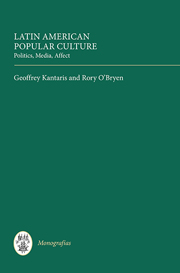Introduction: The Fragile Contemporaneity of the Popular
Published online by Cambridge University Press: 05 October 2013
Summary
It is the ‘inter’ – the cutting edge of translation and negotiation, the in-between space – that carries the burden of the meaning of culture. It makes it possible to begin envisaging national, anti-nationalist histories of the ‘people’ [, … to] elude the politics of polarity and emerge as the others of our selves.
(Bhabha 1994: 38–9)It should not be enough to oppose to the elitism of those positions most critical of mass culture, simply their symmetrical inversion under the figure of a neo-populism seduced by the charms of industrial culture.
(Sarlo 2001: 55)‘Popular culture’ has always represented a fulcrum within social, cultural and anthropological discourses in Latin America. It has often been imagined as inhabiting interstitial and heterogeneous spaces that have represented a challenge to the dominant cultural paradigms of the ‘lettered city’ since at least Colonial times, and has repeatedly been mapped on to political, economic and even libidinal boundaries – between the country and the city, between the folk and the street, between the ‘masses’ and elite national/political structures. Yet since at least the turn of the millennium, concepts of the ‘folk’, the ‘mass', the ‘people’ and the ‘multitude’ have exploded in the face of new cultural and informational technologies, with cinematic, televisual, narrative, musical and cybernetic manifestations of popular culture at the forefront of social processes which mediate between the national and the global in a see-sawing climate of technocratic neoliberal economic ideology, financial crises marked by new and intensified social problems, boom and bust cycles in commodities and resource-extraction, and the rise of demagogic, mediatic neo-populisms.
- Type
- Chapter
- Information
- Latin American Popular CulturePolitics, Media, Affect, pp. 1 - 42Publisher: Boydell & BrewerPrint publication year: 2013



